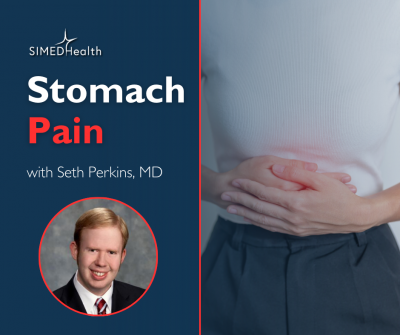
Stomach Pain
Stomach pain or abdomen pain is common and caused by a number of things, from minor discomfort to severe pain. Dr. Seth Perkins, a SIMEDHealth Family Medicine and Geriatrics physician explains the causes, location of pain, and when one should seek medical attention for stomach pain.
To learn more about Seth Perkins, MD, click here.
To schedule an appointment with SIMEDHealth Primary Care, click here.
1. What can be the causes of stomach pain?
There are many possible causes of “stomach pain” (or abdomen pain, as I will call it here). Thankfully, most causes only last for limited periods of time, such as stomach viruses, indigestion, food poisoning, and cramps associated with menstrual periods. However, the sheer number of possible causes of abdomen pain make this condition something that should never be overlooked.
Abdominal pain causes often depend on where the pain is located. For example, if the pain is in the upper right abdomen, gall stones or an infection of the liver or gall bladder may be the cause of it. Possible causes of pain in the upper middle abdomen, include anything from acid reflux to pancreas problems. Even a heart attack can cause pain in this area! Left upper abdomen pain makes us think about a problem with the spleen.
Pain in the lower abdomen can be caused by a number of things too. Infections of the kidneys, the bladder, or the bowels are common causes of pain here. Other serious causes include kidney stones, pelvic pain (especially in female patients), and appendicitis.
Some pain can be located throughout the entire abdomen. This can be caused by anything from constipation or chronic bowel disease to an infection, a blockage in the bowels, or even cancer. It is also worth noting, however, that some of these causes may present with pain that is not in the typical locations. (For example, appendicitis may present with pain throughout the entire abdomen, and cancer may be more likely to present with pain in specific locations.) Abdomen pain is taken seriously in order to make sure it is not due to one of the most serious causes.
2. What other symptoms are often associated with stomach pain?
Just as there are many causes of abdomen pain, there are also many symptoms that can occur with abdomen pain. Several conditions may present with nausea, vomiting, diarrhea, or constipation. Heartburn, increased gas, pain with urination, and bloating are other symptoms that we see with different forms of abdomen pain. More serious causes may have fever, jaundice, weight loss, bleeding, shortness of breath, or chills. However, the symptoms mentioned can be found in any number of causes of abdomen pain. Because this can be confusing, talking with your physician or other members of your healthcare team can help.
3. Are there treatments one should try prior to contacting their doctor?
Most causes of abdomen pain do not need attention in an emergency room or urgent care facility. For example, if pain is associated with constipation, a glass of prune juice may be helpful. If heartburn is present, eating bland foods, avoiding overeating, minimizing acidic foods and drinks, and not lying down soon after eating can help. Staying well-hydrated is also important, especially if diarrhea is present. A warm bath or a hot water bottle may help to ease symptoms of abdominal pain. Finally, there are some safe home remedies that are options for your symptoms. Peppermint can help ease the stomach (although it can also be a trigger for heartburn), and ginger is a good choice for problems with digestion. However, if these are not helpful, it may be time to see a doctor.
4. When should one seek medical attention for stomach pain?
If you are having severe pain following an injury, or if pain accompanied by chest pressure or shortness of breath, call 911 or report quickly to a local emergency room. If you have severe pain or swelling in the abdomen, blood in your bowel movements, fever, discolored skin (especially suggestive of jaundice), a persistent inability to keep food or liquids down, you should contact your physician right away, or be evaluated in an urgent care or ER setting. Symptoms simply not improving with time but not as severe as the ones mentioned above, should prompt an appointment with your primary care provider. They will be able to ask questions and perform an exam, which are essential to narrowing down the potential diagnoses of your pain.
5. What are questions your primary care provider might ask to evaluate the cause of the stomach pain?
A primary care provider will likely begin by asking you how long you have had the pain and where the pain is located. This will allow us to narrow down the list of possible causes. We will also ask if the pain moves anywhere else in the body. The frequency of the pain, how long each episode of pain lasts, and onset of pain (whether the pain started suddenly or more gradually) are also important questions. You will also hear us ask you to describe the pain (for example, we may ask if it is sharp, dull, or something else) and how bad it is. We will ask if there is anything that makes the pain better or worse. All these questions help us to understand what is most likely causing your pain.
Before we begin examining you, we will also ask you about some of the other symptoms you’re having to determine if it may be caused by a specific organ. Your medical history, your surgeries, your personal history (including alcohol consumption and travel history), any sick contacts, and any new medications or supplements are also important. These all provide necessary pieces of information. This extensive history, along with an exam and any necessary labs or studies, are key to diagnosing and successfully treating your abdomen pain.